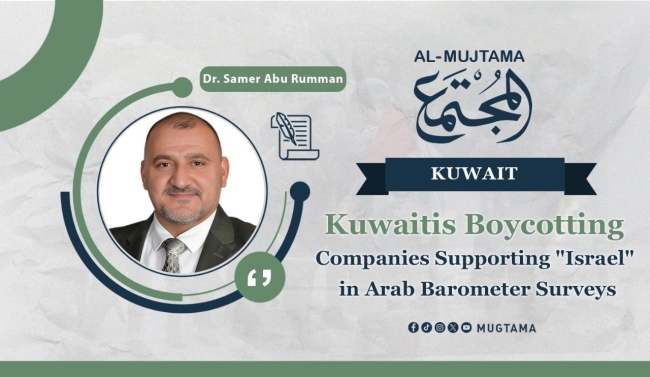Kuwaitis Boycotting Companies Supporting "Israel" in Arab Barometer Surveys
Since the Israeli aggression on the Gaza Strip on October 7th, the Kuwaiti stance in solidarity with the afflicted Strip has been noteworthy. Kuwaitis from all walks of life have shown support for the people of Gaza in various forms, including protests and solidarity stands condemning the aggression, relief campaigns, and sending aid trucks even from humanitarian organizations not primarily focused on Gaza. Among the most prominent actions were campaigns and calls to boycott companies supporting Israel, which will be the focus of this article!
The call for the boycott began in October 2023, with active promotional campaigns urging the boycott of Kuwaiti companies carrying global brand names such as Starbucks and McDonald's, the latter having supported Israel in its war. One of the most notable campaigns was "Did You Kill a Palestinian Today?".
Since then, the call for a boycott has sparked considerable debate in Kuwaiti society, with both supporters and opponents. Supporters argue that the humanitarian, religious, and Arab duty towards Gaza necessitates this boycott.
On the other hand, opponents view this call as populist and the result of incitement by some media personalities and politicians to strengthen what they describe as fundamentalist thought in Kuwait. They argue that it could negatively impact the Kuwaiti economy, creating a hostile environment for investment. The targeted companies are national enterprises licensed by relevant authorities, bearing only the name of their foreign counterparts. Thus, boycotting them would be akin to self-sabotage, targeting the national economy. Additionally, some critics have pointed out that the boycott announcements lack organization and coordination to properly inform the Kuwaiti public about which entities should be boycotted.
This coincided with the preparatory phase of the "Arab Barometer" survey, conducted for the third time in Kuwait during February and March 2024. The survey was a collaboration between Princeton University, Harvard University, the Center for Gulf and Arabian Peninsula Studies at Kuwait University, and the Peace Center, with a sample of 1,210 Kuwaitis from households of both genders across the six provinces of Kuwait.
I had the honor of participating in this survey, which is the largest of its kind to capture the opinions of citizens in Arab countries on political, economic, and social issues. Some members of the research team took the opportunity before the fieldwork began to suggest adding some questions about the war in Gaza, aiming to explore Kuwaitis' views on the matter.
One of the questions asked respondents to choose from a list of ways to show solidarity with Gaza, allowing them to select more than one option. The results revealed that "boycotting companies supporting Israel" was the most popular method, chosen by a significant 83.6%. This was followed by "continuously following the news of the war" at 64.8%, "donating money to aid Gaza" at 62.6%, "sending messages of solidarity through social media" at 44.1%, and "participating in public solidarity events" at 21.5%.
While it is not currently possible to fully gauge the extent of the losses suffered by many brands due to the boycott campaign in Kuwait, given the lack of financial data, a Bloomberg report from last January noted that the boycott campaign in Kuwait, which included Starbucks, had boosted sales for local coffee shops.
The previous results not only reflect the depth of Kuwaiti popular solidarity with Gaza during its crisis but are also the product of free choice. The atmosphere of freedom enjoyed in Kuwait has contributed to making its people free in their choices, decisions, and political and economic thinking!
-------------------------------------------------------------


